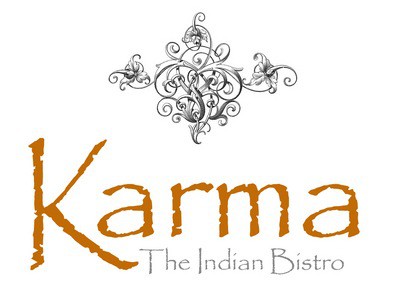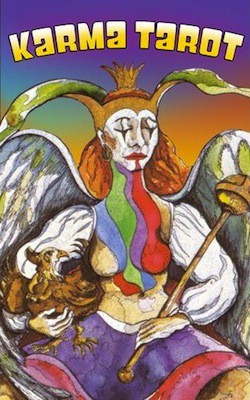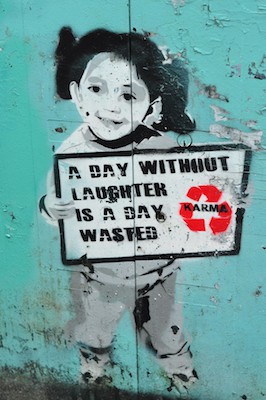Christopher Wallis. How far do we really have the power to choose?
Nuancing an old debate.
Christopher Wallis
by Christopher Wallis (Berkeley, CA)
In the spiritual traditions of India, there are two apparently opposed teachings: 1) you are not the doer (because the spirit part of you is pure witness, and the mind/body part is nature, and the sole cause of the laws of nature is almighty God - Bhagavad Gītā); and 2) the divine Self, the real You, is the Actor (because you are in essence one with God - Śiva-sūtras) and it is You alone who performs the creation and dissolution of your reality (Pratyabhijñā-hrdayam). How can we reconcile these two? I've been contemplating this for almost 20 years, and only now do I feel I'm starting to understand.
My mom recently asked this question in terms of choice and autonomy, sparked by reading my book: "At the end of the Theodicy section you quote Victor Frankl, who talks about transforming personal tragedy into triumph - learning to change ourselves - he talks about choosing one's attitude and one's way - and you mention the power of autonomy. But before you left on your trip you talked about the fact that we actually don't have the power of choice - I would like for you to explain this more. It seems like a contradiction. What I remember you saying is that our brain develops in a certain way which influences how we react and approach things - however, as I've been watching myself over and over again making choices to allow my mind to focus on one thing or another - take one action or another. It seems to me that choice does come into play. Without raising the awareness that I can choose by pausing and reflecting- how can people learn how to turn things around for themselves?"
How far do we really have the power to choose?

This is, undoubtedly, one of the most delicate and crucial of all spiritual issues (if not the most). On the one hand we know that Shaivism stresses the Power of Autonomy as the central power of consciousness, and all spiritual philosophies stress choice as the locus of self-improvement and our opportunity to cleave toward dharma; and on the other hand as cognitive science improves, it increasingly declares that it cannot find a neural mechanism that corresponds to free will, that it's all just conditioning/mental programming, and what appears as choice is just two bits of conditioning in contest. But this is not really an opposition between religion and science: we find the same apparent opposition already in the tradition itself. For it declares that individual agency is a fiction, that there is only one agent, one performer of all actions: God, the sole cause of all. In other words (since in the nondual view God is not conceived as a person or a personality) there is a single "intelligence", or patterned flow of energy, that underlies everything and its flow is irrevocable and eventually proves to be irresistible.
On this view, your journey happens something like this: due to the ripening of your karma (dictated by the laws of cause and effect), you become ready for the spiritual path, and you then find your path, and set your sights on awakening (which expresses the divine will; and thus all souls are destined to form this intention sooner or later, because it is the natural process of returning to the source). Then the teachings of that path begin reconditioning you, laying down new samskāras that are beneficial. Then there follows a period in which it seems you are repeatedly challenged to choose between your old conditioning (say, crack a beer and watch TV) and your new conditioning (have an organic salad, journal about what you learned that day and go to bed early, say). But in fact you are wasting a lot of energy by conceiving this as a choice, and beating yourself up for making the "wrong" choice when you "know better". What is really happening is that two incompatible sets of conditioning are jostling for position, and you are not so much in control of which one gains the upper hand in a particular moment as you conceive yourself to be. Your view of yourself as a "chooser" who can choose wrongly is a mental construct, and one that curiously doesn't serve you most of the time -- because when a wrong choice is possible, choice can become an oppressive burden, and, once made and in the past, a "wrong" choice becomes a source of guilt and self-hatred. To me it is lucidly clear that this is sheer insanity and a huge waste of energy. At every moment, each of us is doing our best with what we know and the energy available to us. The conscious self that takes the credit and the blame for "right" and "wrong" choices is sheer illusion, what we call the ego. However, the tradition teaches what seems to be a contradiction: looking backward (whether a moment or a lifetime), you couldn't have done anything differently; looking forward, you can shape your destiny. How can both be true (since we know from physics that the future is not in fact qualitatively different from the past)? Here's where it gets delicate.

First off, recognize where you actually have power: you (as individual) do *not* have the power to control the outcome of any given situation, ever. (Remember the teaching above that there is only one Agent of all action, and it ain't you--at least not the you you think you are). Therefore, which bit of conditioning wins a given battle is not actually under your control. However, what you can do is give more and more energy to the truths and values that you want to be ultimately victorious in the long term; that is, you can strengthen your spiritual conditioning which will simultaneously weaken your self-defeating old conditioning. You do this by clarifying your aspiration: reminding yourself again and again of what you really want in your deepest heart. It is also important not to become numb to your own suffering through self-distraction, because being in touch with your suffering is one of the most effective reminders of what You really want. The more intensely your flame of aspiration burns, the easier it will be for the newer more healthy conditioning to win out (because those pathways are potentiated with more energy, in cognitive science terms). Focus on the aspiration more than worrying about "making the right choice". But, the objection comes, doesn't this focus involve a choice to strengthen your spiritual conditioning? In a sense, yes, but not an individual/egoic choice--you are simply letting Life do what it ultimately wants to do through you; you are letting God have his way with you, as it were. In the end, you will see that there was never any alternative, just the illusion of one. When you give that illusion energy, your process slows down.
There is yet a step beyond this. Spiritual teachings generate a conditioning-set (a vāsanā, or network of samskāras, in the traditional language) that effectively mirrors the pattern of deeper reality. But doesn't the tradition teach a final escape (mokṣa) from all conditioning, a movement into the pattern itself, free of "mirrors"? Yes. Eventually, the teachings that you have deeply internalized spontaneously dissolve into direct experience of the divine flow. On this level the teachings are no longer needed; you embody their spirit, their source, and their verbal articulation seems an absurdity or a pale approximation at best. Now there is no more struggle, no debate, and, curiously, no more illusion of choice; for the liberated being, there is only one thing to do in every moment, and no need to cognitively determine what that is. It lies naked and clear before you, moment to moment to moment. And here we arrive at the greatest paradox of all (from the mind's perspective) -- the awake one experiences the total Power of Autonomy as the essence of Being, yet never experiences herself as having a choice (except when there is no significant consequence either way). But this paradox appears only if we define choice as "I could choose A or I could choose B". What the awake one experiences is that God/Life/ Consciousness has enthusiastically chosen to become the whole of the present moment, and that, given infinite possibility, has chosen to submit Herself to the pattern (i.e., the laws) of this universe, and finally, consistently chooses to flow towards the place of greatest benefit to all beings, moment to moment, which is why "options" in the conventional sense do not appear to the awake one (except in the case of the inconsequential).

So, let's sum up. In everyday spiritual discourse, we (as teachers and counselors) tell people "you have the power to choose, to become healthy, to shape your destiny," and we tell them this because we wish to empower them. But it can also backfire, because it confers the burden to make the "right" choice and sets up a pattern of self-judgment and self-condemnation for not doing so, that can also get turned onto others (after all, who is more judgmental than a religious person? and yogīs are no exception). Furthermore, it denies the fundamental truth that the individual has no control over the outcome of any given situation, including how his or her mind and body responds. The mind and body act on conditioning--can you really choose what to think? Only apparently, not actually, as any cognitive psychologist will tell you. On the mind-body level you are just constantly reacting to stimuli on the basis of your programming. If two different sets of programming offer two different responses to a situation (e.g., punch the bastard vs. say "I'm feeling really angry right now!"), the programming that is activated more strongly will win. If they are about equal (which is rare), you might be able to tip the scales with a "movement of the will" coming from a deeper place (a little wiggle room for free will there). But much more importantly than this, you DO have truly empowering choice in two significant ways that make a HUGE difference over the long term:
1) you can choose what "angle of perception" to adopt on the present situation. In other words, you can choose how to look at it, and each way of looking at it automatically generates a corresponding attitude or energy state. So to choose your angle of perception is to choose your attitude, and some attitudes give you more energy to work with. This is crucially important. (Of course, whether you can remember to choose your angle of perception, and have the energy to do so in any given moment, is entirely beyond your control. So no point in self-blame or self-praise, again.)
2) You can choose how to recondition yourself -- you can keep absorbing stimuli (esp., the company of awake beings and their writings) that will eventually and inevitably result in the radical restructuring of your whole being; especially focusing on those stimuli that clarify and invigorate your deepest aspiration.
Whether the last two examples "really" constitute free choice or not is irrelevant, because to consider them as within your power to choose is highly effective indeed. Both 1) and 2) are examples of choosing where to place your attention. And here we see why the "Power of Autonomy" (svātantrya-śakti) is a power attributed to awareness, rather than the mind or body. The subtle, simple act of where we place our attention is the one in which we can exercise the most freedom -- and the aggregation over time of this simple choice has, in the end, the greatest power to shape our destiny.
Love.
Mattamayura Institute





